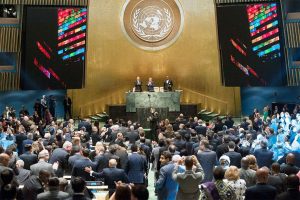7 June 2019: During a standing-room only informal-informal consultation on Friday afternoon, 7 June, UN Member States offered detailed suggestions on the political declaration to be adopted at the SDG Summit in September 2019. This first consultation covered all three sections of the zero draft of the declaration. A new draft is expected on 10 June.
Permanent Representative of Bahamas Sheila Carey and Permanent Representative of Sweden Olof Skoog led the consultations at UN Headquarters in New York, US, after circulating the zero draft on 17 May 2019. They had gathered initial comments on the text in a meeting on 22 May.
In the first informal-informal meeting, several delegations suggested adding and/or strengthening references to disaster risk reduction and biodiversity loss. One said achievement of land degradation neutrality (LDN) is a known accelerator and integrator of multiple SDGs and should be mentioned in the declaration.
Many countries supported strengthening references to gender equality. A few favored referring to human rights, and a couple suggested adding good governance, rule of law and access to justice. A couple of delegations called for emphasizing the importance of multilateralism throughout the draft.
On climate change, one delegation expressed concern about “ambition without action,” and called for specifying the steps leaders would take. Another noted the need to refer to the 1.5 degree and 2 degree commitments of the Paris Agreement. One country preferred to use the term “air pollution” instead of “greenhouse gas emissions.”
Governments also proposed new paragraphs or language to highlight specific issues, such as water, energy, food security and nutrition, sustainable transport, education, and trade connectivity. A few suggested adding sanitation as an area of improvement to date.
One called for recognizing migration as contributing to the SDGs. Delegations differed over whether to recognize forced displacement as a problem. A couple suggested that the commitment to leave no one behind should specify refugees and internally displaced people.
Some suggested references to the regional dimension and regional bodies in implementing and reporting on the 2030 Agenda. A couple of delegations called for recognizing the contributions and importance of stakeholders in implementing the Agenda, with a few suggesting a mention of the contributions of persons with disabilities and youth.
On means of implementation, several pointed to the seven action areas of the Addis Ababa Action Agenda as a way to maintain “balance” in this declaration, while other preferred to highlight a specific source of financing. One suggested calling to operationalize the UN Technology Facilitation Mechanism’s (TFM) online platform. Many favored specifying the need for disaggregated data.
A few delegations outlined ways to incorporate the SDG Progress Report and the Global Sustainable Development Report (GSDR) into the declaration, with one saying the text should be “based on” these two documents. Specific suggestions included:
- Addressing the potential “collisions” among the SDGs by committing not only to maximize synergies but also to addressing trade-offs;
- Referring to “inclusive and sustainable economic growth” to reflect the GSDR’s findings that GDP growth alone will not address multidimensional poverty; and
- Incorporating the concepts of “levers” and “entry points” used in the GSDR.
Others said they could not welcome the GSDR in the declaration, as it is still being analyzed or that they have concerns with its methodology and conclusions.
Some noted that with several SDG targets “due” in 2020, the declaration should contain a commitment to accelerating their implementation, and possibly a call to revise those targets.
On welcoming the summary of the July 2019 session of the HLPF to be produced by the President of the UN Economic and Social Council (ECOSOC), some preferred not to “single out” one session.
On the review of the HLPF that will take place during the UNGA’s 74th session, countries differed over whether to emphasize the intergovernmental character of the Forum. Some cited their desire, instead, to increase stakeholder participation in the Forum. One said the next HLPF cycle should address gaps, emerging issues and trade-offs. One suggested encouraging countries that have not presented a Voluntary National Review of SDG implementation to do so in the next four-year period.
Two governments suggested removing the sentence, “we know the world we want,” explaining that Member States do not all seem to share the same vision. One suggested deleting a pledge to increase national ambition, noting that it is up to each Member State to determine its own priorities
Finally, one country proposed including a decision to convene an annual “SDG Moment” during the opening of each UNGA session until 2030, except in those years when the HLPF is meeting under the UNGA’s auspices in September.
Member States will discuss the forthcoming 10 June version of the text in informal-informal consultations on 12 June. The co-facilitators announced that additional consultations can take place on 17 June if needed. [SDG Knowledge Hub sources] [Zero draft]
Issues
- Follow-Up and Review,
- Desertification & Land Degradation,
- International Negotiations,
- Biodiversity,
- Climate Change,
- Disasters & Humanitarian Relief,
- Economics & Investment,
- Gender,
- Governance,
- Human Settlements & Population,
- Land,
- Poverty Eradication,
- Science,
- Stakeholder Participation,
- Transport,
- Water & Sanitation

